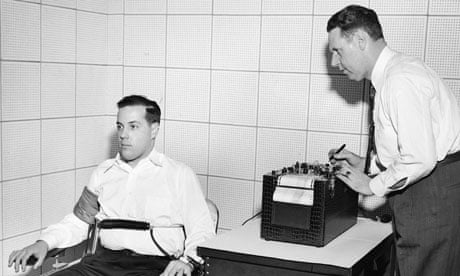source:
https://www.theguardian.com/science/blog/2010/sep/21/brainwave-crime-criminalsThis is where i came into learning more about neurology ...
A brainwave for catching a criminal ?A new study suggests criminals can be detected by measuring a brainwave known as P300. In tests it worked remarkably well, but can we really trust it ? john Larson inventor of the polygraph demonstrates his machine at Northwestern University21 Sep 2010Terrorists could be identified by a brainwave test that detects concealed information about an imminent attack, according to a study by psychologists from Northwestern University in Chicago.
john Larson inventor of the polygraph demonstrates his machine at Northwestern University21 Sep 2010Terrorists could be identified by a brainwave test that detects concealed information about an imminent attack, according to a study by psychologists from Northwestern University in Chicago.The test, a sophisticated version of the now-discredited polygraph (or lie-detector) test, is based on the so-called guilty knowledge test developed in the 1950s. Whereas the traditional lie detector test involves asking the suspect whether or not they committed the crime in question, the guilty knowledge test focuses on specific details that would only be known to the perpetrator.
In the 1980s,
Peter Rosenfeld combined the guilty knowledge test with recordings of the brain's electrical activity. He exploited a brain wave pattern called the P300, which occurs in response to visual stimuli after a delay of 300 milliseconds, and can be detected with electrodes attached to the scalp.
It is well known that task-related stimuli, or stimuli that are meaningful in some other way, produce a larger P300 response than others. For the guilty knowledge test, this increased response can be a neurological signature of the unconscious recognition of a familiar object, event, or piece of information.
Rosenfeld's group has already applied the test in a
mock crime scenario, using it to identify participants who had knowledge of a stolen object. In the new study, they applied the test to a mock terrorist situation, recruiting 29 university students and dividing them into "guilty" and "innocent" groups.
The "guilty" group was given a document explaining that they would play the role of a terrorist planning an attack, and containing four different options each for how the attack could be carried out, the types of bombs that could be used, locations in Houston, Texas, that could be targeted, and dates in July on which the attack could be carried out.
A neuroscientist explains: the need for ‘empathetic citizens’ - podcastHaving planned the mock attack, they wrote a letter to an imaginary superior, containing the choices they had made, to aid memorisation of the plan details. The participants in the "innocent" group planned a mock holiday instead.
Both groups were then shown a long series of words on a computer screen, while the researchers recorded their P300 responses. Most of the words were irrelevant to the mock attack, but a few were "probes", relating to the specific details in the plans, and were included to evoke a stronger P300 in those participants with concealed knowledge of the details.
The researchers identified all of the "guilty" participants, without incorrectly identifying any of the "innocent" ones. They were also able to identify most of the attack-related details, enabling them to establish where and when each of the mock attacks would take place.
But the real world is infinitely more complex than the carefully controlled laboratory conditions under which the study was carried out. Here, the researchers detected concealed knowledge of a very limited set of details that were already known to them. In reality, an investigator would have little or no information of a planned attack.
Another limitation of the test is that the "probes" could have some meaning to a suspect in some other way. Three of the participants had to be excluded from the study because one of the probes had personal relevance to them, so produced false positive results. Guilty knowledge acquired incidentally could also produce a false positive. Furthermore, there are various
countermeasures that can be used to confound the results.
Could these tests be used to establish a suspect's guilty knowledge after a crime has been committed ? This, too, is problematic, because it is based on the assumption that memory is infallible. We have known, however, since the work carried out by Sir Frederic Bartlett in the 1920s that memory is reconstructive, and not reproductive, in nature.
That is, we do not recollect events as they actually happened, but according to our own biases and experiences. Remembering involves stitching together fragments of memories, and errors inevitably creep in. Normally, the memory is accurate enough to be reliable, but occasionally it is not. It may even become increasingly inaccurate with each successive recollection. We can confabulate spontaneously, and false memories can be implanted with relative ease, as Elizabeth Loftus has shown.
Despite lacking validity outside the lab setting, the P300 test and similar techniques, such as "brain fingerprinting", are admissible in some courts of law in the United States and in 2008, India became the first country to use the guilty knowledge test to convict someone of a crime.
It would therefore be wise to properly evaluate how effective these tests are before they are used routinely in the courtroom. And, if that were to happen routinely, to regulate their use by companies who offer them as a service to the legal profession.
EDIT: see also
Detecting Concealed Information and Deception: Recent Developments or the attachment.








